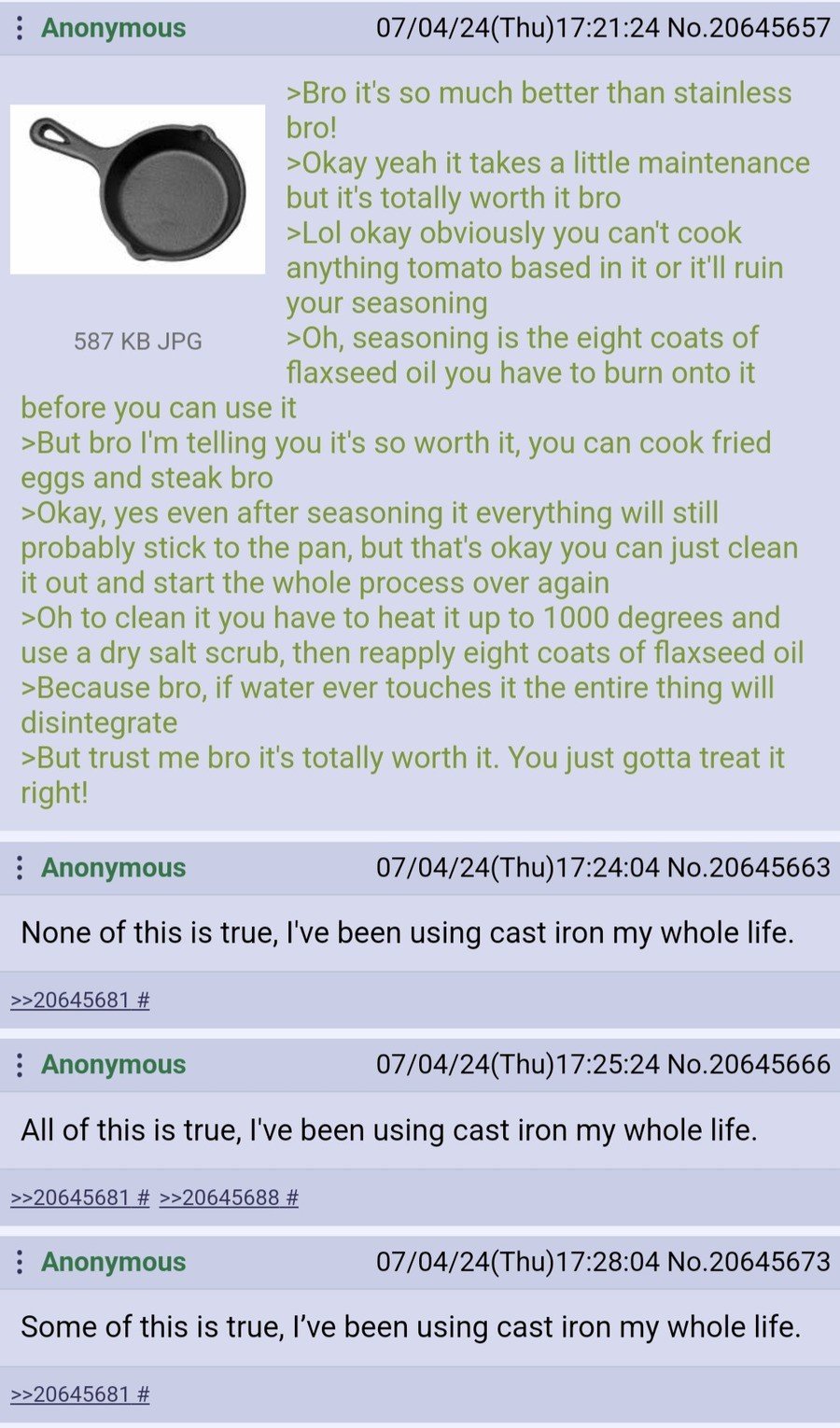this post was submitted on 02 Oct 2024
994 points (99.3% liked)
Greentext
5949 readers
1323 users here now
This is a place to share greentexts and witness the confounding life of Anon. If you're new to the Greentext community, think of it as a sort of zoo with Anon as the main attraction.
Be warned:
- Anon is often crazy.
- Anon is often depressed.
- Anon frequently shares thoughts that are immature, offensive, or incomprehensible.
If you find yourself getting angry (or god forbid, agreeing) with something Anon has said, you might be doing it wrong.
founded 2 years ago
MODERATORS
you are viewing a single comment's thread
view the rest of the comments
view the rest of the comments

In all seriousness my cast iron never looses its seasoning and is the best non stick I have in my house. I refuse to go back to PFSA
People have weird ideas about seasoning. It is literally oil polymerized and bonded to the metal with high heat; but people act like it just rubs off. You can scrape seasoning off, but it's hard. I need steel wool to do it.
I think these people complaining aren't really seasoning their pans - just using dirty pans (i.e. the oil hasn't fully polymerized).
Different types of oils form different polymerized surfaces, too. Related to the greentext, some people came up with the idea of flaxseed as the best oil for seasoning cast iron based on some theorycrafting about chemistry at a high school level, and it turned out that flaxseed oil seasoning chips and flakes really, really easily.
So there are a bunch of people out there doing it wrong and complaining that it's too fussy.
How about olive oil? Does it work and make anything you cook smell/taste more delicious?
Also, I've heard some mention that cast iron pans can infuse your food with more iron, but wouldn't the seasoning block that? Or do iron ions move through the seasoning over time?
It's pretty likely that the temperature needed to polymerize the oil would destroy whatever compounds are responsible for making olive oil taste and smell the way it does. Plus, if done well, seasoning creates a permanent bond between the polymer and the metal, so you probably wouldn't get anything to come out of the seasoning into the food.
As for adding iron to the food, you might be thinking of acidic foods causing iron to leech out into the food. If the seasoning is "perfect" then this might not happen, but any weakspots in the seasoning can allow acids to corrode the pan if they're left there long enough. Common advice you'll find is to avoid cooking acidic food for long periods of time (e.g., simmering tomato sauce for several hours)
No there are actual cast iron trinkets you can cook with to fortify your food with iron. I can't answer if that same effect would work through seasoning though.
Olive oil works well for seasoning, idk about taste though. You burn all that stuff away and what's left is bonded to the pan so there's not much room for flavor to transfer.
Grapeseed oil.
Cheap at big box stores. Incredibly high smoke point. Dirt cheap.
Use that for first couple layers and after that honestly whatever oil or fat you want to use or have. I re-up my pans with everything from Crisco to just cheap "vegetable" oil (rapeseed or soy usually) and even duck fat from after making other dishes.
Don't expect any to necessarily be more delicious but sometimes you get different flavors from what sorta burns in. You supposedly might get some iron passing through but it's actually kinda a necessary mineral like volcanic ash.
Yeah, to clarify, I was asking about the iron because I understood it to be a generally good thing but then questioned whether it really was an advantage of cast iron pans at all.
Though for the grapeseed oil having a ridiculously high smoke point, wouldn't adding a final layer of something else mean that that will have the relevant smoke point?
I use whatever is on the counter usually, but lard (homemade), bacon fat (clarified) and avocado oil are the usual and seem the best when doing the high heat seasoning. I just get the pan hot after cleaning it, with a very thin layer of oil (wiped as thin as possible) and keep wiping oil in there awhile with a paper towel, take it off the heat and occasionally wipe it with the paper towel to spread it evenly.
Pancakes also work as pan rehab. The long low heat works to get them smooth again. I use butter for that, which leads me to believe that any fat is probably fine.
Avocado oil is what I use. It has the highest smoke point of the readily available cooking oils, is supposedly healthier than other oils, has a clean flavor and doesn’t peel once polymerized for me. Olive oil works, and so does various other fats; bacon, tallow, butter etc.
I use my cast iron more than any other pans because it is more versatile than my carbon steel or stainless steel pans. Each have their own place but cast iron works for more of what I do. The cast iron absorbs heat and works well for doing high heat cooking so having an oil that doesn’t burn until higher temps gives more temp ranges to operate in. When an oil/fat goes past it’s smoke point it becomes a carcinogen and is unhealthy to breath/eat. So avocado oil’s smoke point just over 500° is better than olive oil at around 300°-350°f.